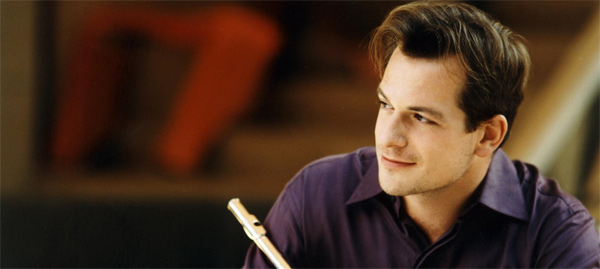Early life
Travelling has been a big part of Emmanuel Pahud's life from birth. His father worked for a U.S. company, and the family moved repeatedly during his childhood. However, this would only shape Pahud's international outlook for his future. Only six weeks after Pahud was born, his parents moved to Baghdad for one year. They moved again when he was 1 to Paris, where Emmanuel's younger brother was born. In 1972, they then moved to Madrid for two years, and in 1974, finally settled in Rome for four years. In their apartment building in Rome, lived the Swiss-French Binet family whose four children played musical instruments. The father (François) was a flautist who studied in Zurich and Paris but stopped performing in later years. At the age of four, Pahud first heard the flute. As the eldest son Philippe played the Flute Concerto No. 1 (Mozart) K.313 in G Major, it set the course to a remarkable chapter of Pahud's life. He recalls:I could hear the flute, the violin, the cello, the piano. I don't know why I chose the flute but maybe it was because the eldest son was playing it, so he was the one playing at the best level at that time - or because the father was also a flute player, so there was a kind of authority there. Anyhow, I said to my parents, "I want to play the flute, I want to play the Mozart concerto that guy next door is practicing."

That Christmas, after receiving his first flute, Pahud began his first year of lessons with Philippe (who was only 15 years old) and the next three years with Phillipe's father, François.
In 1978, at the age of eight, the Pahud family moved to Brussels, Belgium. Emmanuel then began studying at the Music Academy of Uccle in Southern Brussels. There he studied with Michel Moinil from 1979-1985. As he became more determined and focused on playing the flute at a higher level; Pahud began to study from 1984-87 with Carlos Bruneel, the then and current principal flautist of the Théâtre Royal de la Monnaie opera house in Brussels. In 1985, Pahud won the National Competition of Belgium (le concours National de Belgique) and in the same year, he played his first concert with the National Orchestra of Belgium, performing the piece that inspired him 11 years earlier: Mozart Concerto K.313 in G Major. Pahud remained in Brussels until receiving his A-Level at the age of 17 and went off to finish his schooling in Paris. With the strong support of his family, he also received lessons with other of Europe's finest players, including Peter-Lukas Graf in Basel.
